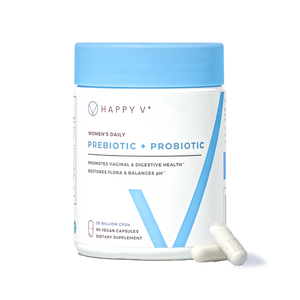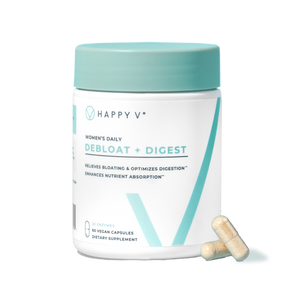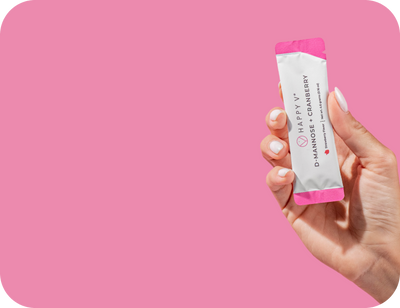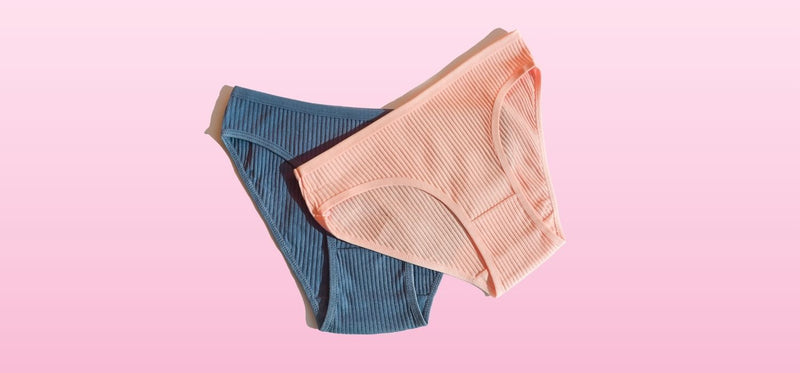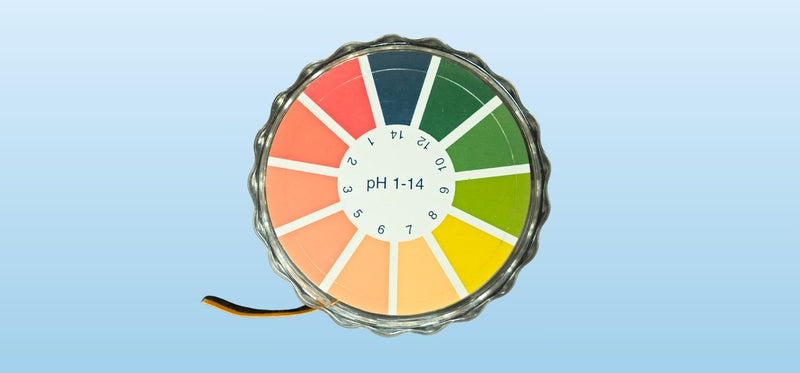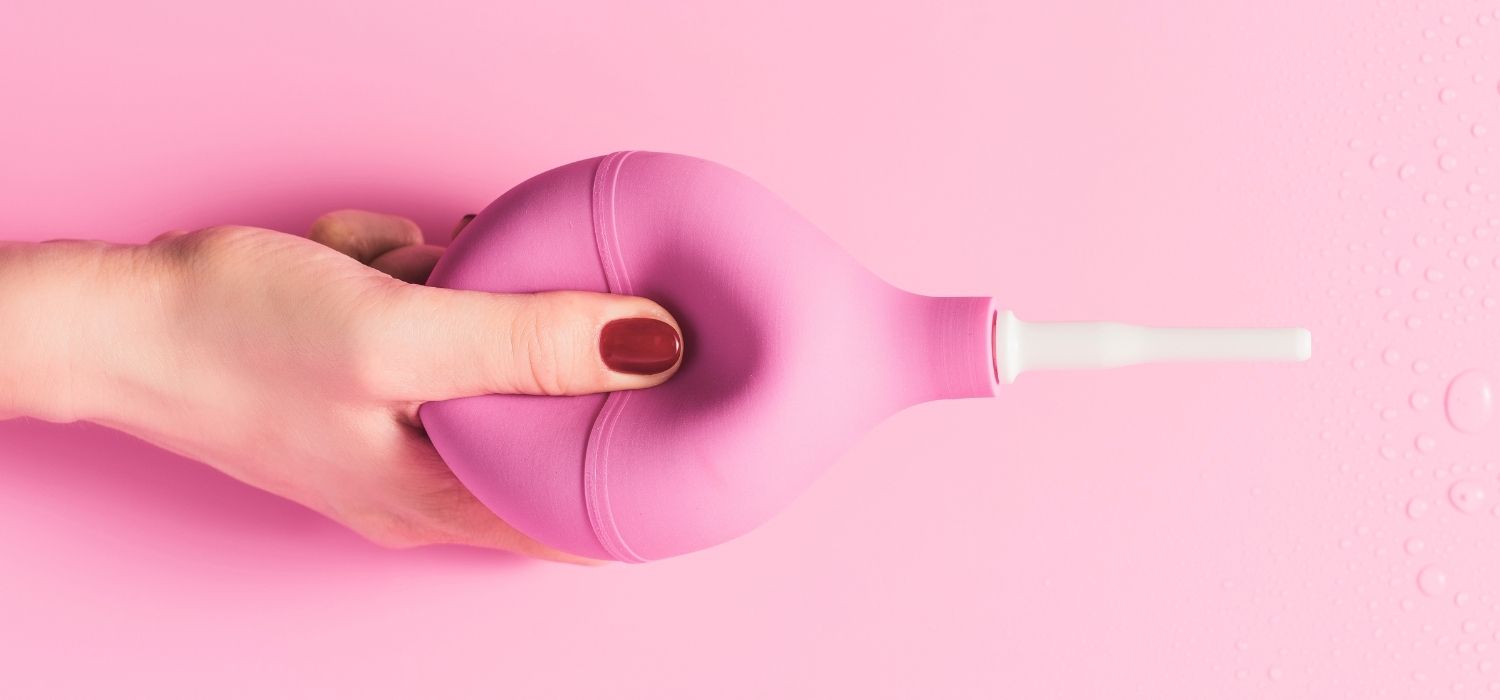
- Fact Checked
- November 21, 2025
- 14 min read
Is Douching Good for You? The Truth About Vaginal Cleansing
Table of Contents
Table of Contents
If you've ever felt self-conscious about vaginal odor or discharge, you're not alone. Many women have wondered whether douching might help them feel "cleaner" or fresher. In fact, studies show that approximately 20-40% of American women ages 15 to 44 douche regularly1, with even higher rates among certain communities.
But here's the truth: despite being marketed as a way to keep yourself clean and healthy, it can do more harm than good when it comes to your vaginal health. In fact, douching is actually not recommended by almost all healthcare professionals.
So what should you do instead? Keep reading because we’ll be sharing some simple ways to maintain a healthy, balanced vaginal microbiome (no douching required).
This post is for informational purposes only and does not constitute medical advice. See full disclaimer below.
What Exactly Is Douching?
Vaginal douching is the practice of intravaginal cleansing. In other words, it’s a way of washing or cleaning out the inside of the vagina using a mixture of fluids2, with water and/or vinegar being the most common. The word "douche" actually comes from the French word meaning "to wash" or "to soak."
What's in a Douche?
Prepackaged douches (or douching kits) are available at most drugstores and supermarkets. These products typically contain:
- Water and vinegar (the most common combination)3
- Water and baking soda
- Water and iodine or other antiseptics
- Various chemical mixtures that may include fragrances
Some women also make homemade douching solutions using similar ingredients, believing this to be a "more natural" option.
Whether you buy the solution as part of a kit or make it yourself, that solution is typically placed in a bottle or bag with a nozzle or tube attachment. The nozzle is inserted into the vagina, and the solution is sprayed or squeezed upward into the vaginal canal, with the goal of flushing out its contents.
The liquid is meant to rinse through the vagina and flow back out, theoretically taking bacteria, discharge, menstrual blood, semen, and other substances with it.
Why Medical Experts Are Against Douching
While the motivations for douching may be understandable and sound logical enough, the medical evidence is unequivocal: do. not. douche. The American College of Obstetricians and Gynecologists (ACOG), the CDC, the U.S. Department of Health and Human Services, and virtually every major women's health organization strongly advise against douching4.
Why such a strong stance against douching? There are actually a few key reasons:
Your Vagina Is Self-Cleaning
Your vagina is designed to maintain its own delicate balance without any help from external cleaning products. It naturally produces discharge that helps flush out dead cells and bacteria, keeping everything clean and healthy. Think of it like your eyes producing tears; it's a normal, protective function.
When you douche, you're essentially interfering with this natural self-cleaning process. Rather than helping, you're disrupting the carefully balanced ecosystem that keeps your vaginal microbiome healthy.
Douching Disrupts Your Vaginal Microbiome
A healthy vagina is home to millions of beneficial Lactobacillus bacteria (often called lactobacilli)5. These good bacteria produce lactic acid, which maintains a slightly acidic pH (typically between 3.8 and 4.5) that prevents harmful bacteria and yeast from growing to the point of infection6.
When you douche, you don’t just wash away the harmful bacteria; you also wash away protective Lactobacillus bacteria along with it. This disrupts your vaginal flora and raises your pH, creating an environment where harmful bacteria and yeast can thrive.
So though women often douche to address vaginal odor or discharge, the reality is douching actually makes these problems worse.
The Health Risks Are Real and Serious
Research has consistently linked douching to a range of serious health problems and health and hygiene problems, including:
Bacterial vaginosis (BV)
Douching is one of the most significant risk factors for developing BV7, an infection caused by an overgrowth of harmful bacteria. In fact, studies show that women who douche are up to five times more likely to develop BV than those who don't. BV causes fishy-smelling discharge, itching, and discomfort, which are ironically the exact symptoms many women are trying to prevent by douching in the first place.
Yeast infections
By disrupting the balance of bacteria and raising vaginal pH, douching makes it easier for Candida (yeast) to overgrow, which leads to symptoms like itching, burning, and thick white discharge.
Pelvic inflammatory disease (PID)
Douching can push bacteria from the vagina up into the uterus, fallopian tubes, and ovaries, leading to PID, a serious infection that can cause chronic pelvic pain, scarring of reproductive organs, infertility, and ectopic pregnancy8. This is probably why women who douche weekly have been found to have significantly higher rates of PID.
Sexually transmitted infections (STIs) and sexually transmitted diseases
Doesn’t seem like it should be true, but it is! Studies suggest that douching may increase susceptibility to STIs, including HIV9, by damaging the vaginal lining and disrupting protective bacteria. Far from preventing STIs (as some women hope), douching may actually increase the risk of infections.
Pregnancy complications
Women who douche regularly, even when not pregnant, have higher risks of:
- Ectopic pregnancy (a life-threatening condition when a fertilized egg implants outside the uterus, usually in a fallopian tube)
- Preterm birth (delivering before 37 weeks)
- Difficulty getting pregnant/infertility (due to PID-related scarring of the fallopian tubes and ovaries)
And before we move on, we want to be 100% clear that while douching is never a good idea at any time, it should never, ever be done during pregnancy (ever, ever).
Why Do Women Douche?
Despite the health community being so anti-douching, it’s surprisingly popular as a practice.
According to the National Survey of Family Growth, approximately 20-40% of American women ages 15 to 44 report douching regularly (at least once every three months, though many report douching weekly). However, this number varies significantly by demographic. Here’s how it breaks down:
-
African American women: Studies show that 40-60% douche regularly, with some research indicating rates as high as 66%
-
Latina/Hispanic women: Approximately 30-40% report regular douching
-
White women: About 20-25% douche regularly
-
Teenage girls and young women: Prevalence increases during adolescence and peaks in the early 20s
When researchers asked women why they douche, several consistent themes emerged, with the most common being:
1. Perceived hygiene and cleanliness
This is the #1 reason women give for douching. Many women believe douching is necessary for vaginal cleanliness, particularly:
- After menstruation (to "clean out" menstrual blood)
- After sexual intercourse (to "wash away" semen)
- As part of a regular personal hygiene routine (similar to bathing or brushing teeth)
Some women describe feeling "unclean" without douching, viewing it as essential to being a "clean" woman.
2. Eliminating or preventing vaginal odor
Concerns about vaginal odor drive many women to douche. This includes:
- Worrying about how they smell to sexual partners
- Feeling self-conscious during gynecological exams
- Believing that a "normal" vagina should have no scent at all
- Trying to achieve a "fresh" or "clean" smell
3. Cultural and family traditions
Research shows that having a mother or close female relative who douches significantly increases the likelihood that a woman will douche.
That’s because, for many women, douching is a learned behavior passed down through generations. Mothers teach daughters that douching is a part of feminine hygiene because that’s what they learned from their mothers, and these generational practices have been followed for decades without question. The reason for this is sometimes cultural, with certain communities framing douching as “proper womanhood.”
4. Treating or preventing infections and health problems
Some women douche because they believe it will:
- Prevent or treat yeast infections
- Prevent or treat bacterial vaginosis
- Reduce risk of sexually transmitted infections
- Serve as a contraceptive method after unprotected sex
- "Cleanse" the vagina after exposure to STIs
Unfortunately, as you just read earlier, douching actually puts a woman at greater risk for infections, and more than that, it is not (as in never ever) a safe, reliable contraceptive method.
Common Myths About Douching—Debunked!
Despite the clear medical evidence against it, several persistent myths keep women douching. Let's set the record straight:
Myth: Douching after sex prevents pregnancy or STIs
Reality: Douching is NOT a contraceptive method and will not prevent unwanted pregnancy or serve as a reliable form of birth control. Sperm move incredibly quickly. They can reach the fallopian tubes within just minutes of ejaculation(!). Similarly, douching does not protect against sexually transmitted infections and may actually increase your risk by irritating vaginal tissue and disrupting protective bacteria.
If you are ever in need of emergency contraception, speak with a healthcare provider about options like Plan B that are actually effective. For STI prevention, use condoms and get tested regularly.
Myth: You need to douche to be clean
Reality: Vaginas are never odorless, and they will never smell like roses. And the belief that vaginas are inherently "dirty" or need special cleansing methods is rooted in stigma, not science. Douching to eliminate slight, natural odor often backfires, as it disrupts your microbiome and can actually cause stronger odors due to bacterial overgrowth. If you're experiencing unusual or strong vaginal odor, this is a sign of an underlying issue (like BV or an infection) that needs proper medical treatment. Douching will only make the odor worse.
Myth: Douching with water (or douching with just water) is safe
Reality: Even douching with plain water disrupts your vaginal pH and microbiome. While water doesn't contain harsh chemicals, forcefully rinsing out the vagina still washes away beneficial bacteria and interferes with your body's natural cleaning process. Water-only douching carries the same risks as chemical douches.
Myth: Douching helps treat vaginal infections
Reality: It’s the opposite, actually. Douching doesn't treat infections. It actually causes them or makes them worse. If you have bacterial vaginosis, you need antibiotic treatment. If you have a yeast infection, you need antifungal treatment. Douching will only prolong your symptoms and potentially spread infection to other reproductive organs, leading to more complications.
Myth: Natural or homemade douches are safer
Reality: Natural doesn't mean safe when it comes to douching. Even homemade douches using ingredients like water and vinegar, water and baking soda, or those marketed as "natural," still disrupt your vaginal microbiome and pH. The problem isn't just the chemicals; it's the act of forcefully rinsing out the vagina.
Myth: Douching is a normal part of personal hygiene
Reality: Just because a practice is common or traditional doesn't make it medically sound. While douching has been normalized in some communities and marketed as a hygiene essential, medical science is clear that it's unnecessary and harmful.
Special Situations: What About Douching After Sex or During Your Period?
Some women specifically wonder about douching in certain situations, like after sex, during their period, or after sexual assault. The medical community still recommends against douching, even in these circumstances.
After sex
There's no medical reason to douche after sexual intercourse. Your vagina naturally clears out semen and bacteria. If you're concerned about pregnancy, douching won't help. Use contraception methods like condoms or birth control pills instead. If you're worried about STIs, use condoms and get tested regularly.
During or after menstruation
Your vagina naturally expels menstrual blood without any need for douching. Some women feel self-conscious about odor during their period, but this is normal and temporary. If you're experiencing particularly strong odors or discomfort, this may indicate an infection that needs medical attention, not douching.
After sexual assault
If you've experienced sexual assault, do not douche! It can destroy evidence that may be important for medical care and legal proceedings. Seek immediate medical attention at a hospital or clinic that can provide appropriate care, including a rape kit, STI testing, emergency contraception, and support resources.
Douching Alternatives for Vaginal Health
So if douching is out, what should you do instead? The good news is that maintaining a healthy vaginal microbiome is actually much simpler than you might think. Focus on these key areas:
Keep External Washing Gentle and Simple
The vulva (the external part of your genitals that’s commonly mistakenly referred to as the vagina) can be gently cleaned, but the vagina itself should be left alone.
If you do want to clean your vulva, follow these science-supported steps:
- Use only warm water or mild, unscented products. Avoid any products with fragrances, dyes, or harsh chemicals (even if they’re marketed as vaginal washes), which can cause irritation and allergic reactions.
- Wash gently from front to back to avoid spreading bacteria from the rectal area to the vagina, as this can lead to infections like urinary tract infections.
- Skip the inside completely. Never insert soap, douches, or any cleansing products inside the vagina.
Wear Breathable, Cotton Underwear
Your clothing choices, especially from the waist down, can impact vaginal health. Opt for cotton underwear, which is breathable to keep the area dry (bad bacteria love moisture), and loose-fitting pants whenever possible.
After you work out or go for a swim, change out of your wet and sweaty clothes as soon as possible to prevent bacteria build-up.
Practice Good Bathroom Habits
Good bathroom habits require more than just washing your hands, particularly when it comes to your vaginal health. Make sure to:
- Wipe from front to back after using the bathroom10
- Urinate after sex to help flush out any bacteria11
- Change tampons or pads regularly during your period to manage menstrual blood
- Avoid scented feminine hygiene products, including scented tampons, pads, and sprays
Take a High-Quality Daily Probiotic
Unlike douching, which strips away your protective bacteria, high-quality probiotics help restore and maintain the healthy bacteria and balance of bacteria your vagina needs.
Specific strains of Lactobacillus—including Lactobacillus acidophilus (LA-14®), Lactobacillus rhamnosus (HN001™), Lactobacillus crispatus (CCFM1110™), and Lactobacillus reuteri (HR7™)—have been shown in clinical studies to:
- Lower vaginal pH to healthy, protective levels12
- Reduce the risk of bacterial vaginosis and yeast infections
- Support the growth of beneficial bacteria while discouraging harmful microbes and pathogens
- Help restore balance after antibiotic use (which often disrupts vaginal flora)
- Prevent the overgrowth of harmful bacteria
Happy V Prebiotics + Probiotics are specifically formulated with these clinically studied strains at effective doses to support your vaginal microbiome, urinary tract health, and digestive wellness. Unlike generic probiotics or foods like yogurt (which support gut health but don't necessarily contain vaginal-specific strains), Happy V delivers targeted support where you need it most.
A daily probiotic can be especially important if you've been douching regularly. Your vaginal microbiome may need extra support to rebuild the healthy lactobacilli population that douching has depleted.
Make Healthy Lifestyle Choices
Your vaginal health is often an indicator of your overall wellness, which means that improving it comes down to healthy lifestyle choices like:
- Managing stress, which can affect your immune system and microbiome
- Staying hydrated
- Eating a balanced diet that focuses on whole foods
- Avoiding unnecessary antibiotic use when possible (but always completing prescribed courses)
- Practicing safe sex and communicating with partners about sexual health
Final Thoughts
When it comes to vaginal health, your body has sophisticated systems in place to maintain balance, and the best thing you can do is support those natural processes rather than interfere with them.
Skip the douche, and if you want to actively support your vaginal health, choose evidence-based approaches like targeted probiotics, gentle hygiene practices, and regular checkups with your healthcare provider.
Your vagina is healthy, normal, and perfectly capable of taking care of itself. Trust it.
Keep the Conversation Going
- Visit our blog for more women's health tips.
- Join our private Happy V Facebook group to hear from others who've been there.
- Explore supplements designed to support your vaginal health journey.
Disclaimer: This blog is for informational and educational purposes only and is not intended to diagnose, treat, cure, or prevent any disease. Statements about supplements have not been evaluated by the Food and Drug Administration. For more information about vaginal infections, visit the CDC or speak to a licensed healthcare provider.
